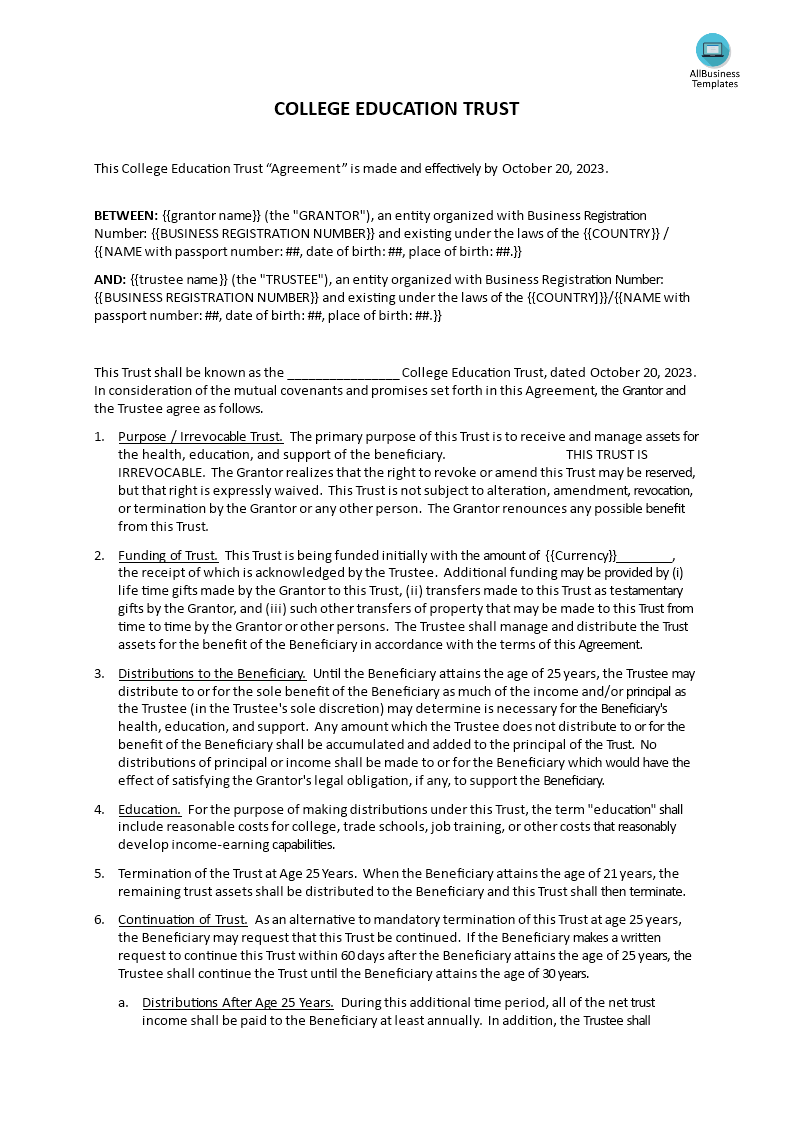College education trust
Save, fill-In The Blanks, Print, Done!

Download College education trust
Today: USD 3.99
Download It Now

Available premium file formats:
Microsoft Word (.docx)- This Document Has Been Certified by a Professional
- 100% customizable
- This is a digital download (31.87 kB)
- Language: English
- You will receive a link to download the file as soon as your payment goes through.
- We recommend downloading this file onto your computer.
How to make a College education trust? Do you need a College education trust? Our template is designed to help you create a trust that will fund your college tuition. It includes all the necessary information and guidance to make the process quick and easy. The template is available for download. We provide a well-crafted College education trust template that suits your needs!
A college education trust typically refers to a specific type of trust that is established to provide funds for the educational expenses of a beneficiary, often with a focus on funding college or higher education. This type of trust is created by a grantor (the person establishing the trust) and is designed to help finance the educational needs of a designated beneficiary, such as a child, grandchild, or another loved one, to pursue a college or university education.
Here are some key features and aspects of a college education trust:
- Purpose: The primary purpose of a college education trust is to set aside funds to cover the costs associated with higher education, including tuition, fees, books, room and board, and other related expenses.
- Beneficiary: The trust beneficiary is typically an individual who is planning to attend college or pursue higher education. The beneficiary may be a child or grandchild of the grantor, but it can also be any person or entity specified by the trust document.
- Trustee: The trustee is responsible for managing and administering the trust, including making distributions for the beneficiary's educational expenses. The grantor can designate a trustee, which could be themselves or a trusted third party.
- Funding: The grantor funds the trust with assets, such as cash, investments, or other property. These assets are managed and invested by the trustee to generate income and potentially grow the trust's principal over time.
- Distributions: The trust document outlines the criteria and conditions under which distributions will be made to cover the beneficiary's educational expenses. Distributions are typically made directly to the educational institution or to the beneficiary, depending on the trust's terms.
- Duration: College education trusts can be set up to cover a specific period, such as the duration of a four-year college program, or they can be designed to provide ongoing support for the beneficiary's educational pursuits.
- Flexibility: Some college education trusts are structured to allow flexibility in how the funds are used, allowing beneficiaries to use them for trade schools, vocational programs, graduate school, or other forms of higher education.
- Tax Benefits: Depending on the trust's structure and applicable tax laws, contributions to the trust may be eligible for certain tax benefits, and the trust's income and distributions may be tax-advantaged.
- Trust Terms: The trust document outlines specific terms and conditions, including how trust assets are invested, how often distributions are made, and any contingencies or conditions for receiving funds.
- Termination: The trust may have provisions for its termination, which could occur when the beneficiary completes their education or at a specified future date.
College education trusts can be a valuable tool for families and individuals who want to ensure that educational opportunities are financially accessible. These trusts provide a structured way to save and invest for higher education expenses, potentially reducing the financial burden on the beneficiary and their family.
Download this Contract establishing a college education trust now!
DISCLAIMER
Nothing on this site shall be considered legal advice and no attorney-client relationship is established.
Leave a Reply. If you have any questions or remarks, feel free to post them below.
Related templates
Latest templates
Latest topics
- Letter Format
How to format a letter? Here is a brief overview of common letter formats and templates in USA and UK and get inspirited immediately! - Google Sheets Templates
How to work with Google Sheets templates? Where to download useful Google Sheets templates? Check out our samples here. - Influencer Marketing Templates
What makes a good influencer? Check out our effective and useful Influencer Marketing Templates here! - House Cleaning Schedule Daily Weekly Monthly
Cleanliness is not just about what’s outside; it reflects what’s inside." Check out our House Cleaning Schedule Daily Weekly Monthly templates here. - Google Docs Templates
How to create documents in Google Docs? We provide Google Docs compatible template and these are the reasons why it's useful to work with Google Docs...
cheese
